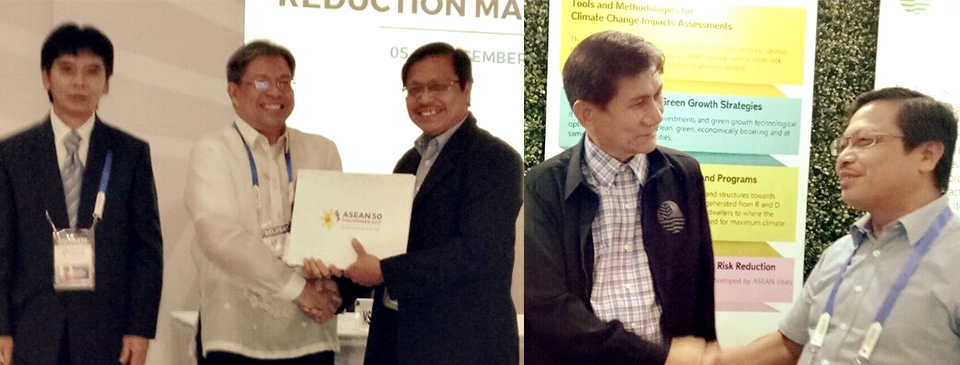The event was part of the ASEAN 50 series of regional conferences and dialogues hosted by the Government of the Philippines through the Department of Environment and Natural Resources (DENR).
Institutional capacity building is a major component of the project Climate Resilience and Green Growth (CRGG) in Critical Watersheds, a Technical Assistance (8493) of the Asian Development Bank (ADB) to the Climate Change Commission (CCC) of the Philippines, funded by the Japan Fund for Poverty Reduction (JFPR).
The Lower Marikina local government units (LGUs) covered by the project include Cainta in Rizal, Quezon City, and Marikina City. These LGUs are part of the Marikina Watershed ecosystem. Other watersheds covered by the project are in Camarines Sur and Davao Oriental.
The presentation highlighted how various capacity building and training courses led to the formulation and adoption by the LGUs Local Climate Change Action Plans (LCCAPs) and the Watershed level CRGG Road Maps.
The participatory training courses with mentoring approach to LGUs included the conduct of baseline calculations, vulnerability and risk assessments (VRA), greenhouse gas (GHG) inventory, natural resources assessment (NRA), environment and natural resources accounting (ENRA), cost benefit analysis (CBA) of priority climate change adaptation measures, preparation of LCCAP, mainstreaming of climate action to local planning, and implementation of CCA pilot projects.
The paper presented by Dr. Santos and Dr. Pasicolan is one of more than 40 major research and development projects on CCA/DRRM carried out and being implemented in Southeast Asia and other neighboring countries, including Japan and India. Dr. Pasicolan is the Climate Change Capacity Building Specialist of ADB TA 8493.
The paper showed a significant increase in the capacity of LGU personnel in mainstreaming climate change adaptation and disaster risk reduction in local development planning. The CCA pilot projects effectively capacitated LGUs in implementing CCA intiative in their respective areas.
The Municipality of Cainta in Rizal has implemented the Solid Waste Management and River Pollution Abatement Program through Bokashi Balls Production, while Marikina City has initiated Policy Development for a Green Building Program. Quezon City is yet to implement its identified priority project Strengthening Early Warning System through Participatory Three-Dimensional Mapping for Disaster Risk Reduction Management.
The Forum was coordinated by Dr. Simplicia A. Pasicolan of DENR-Ecosystems Research and Development Bureau (ERDB). The plenary speakers included Dr. Khamarrul Azahari Razak, Research Manager and Senior Lecturer of UTM Razak School of Engineering and Advanced Technology, Universiti Teknologi Malaysia; Dr. Juan M. Pulhin, Professor and UP Scientist III, College of Forestry and Natural Resources, University of the Philippines Los Baños (UPLB); Dr. Bharat Dahiya, Senior Adviser and Urbanist, Chulalongkorn University, Thailand; Dr. Felino P. Lansigan, Dean, College of Arts and Sciences, UPLB; and Mr. Ran Yagasa, Policy Researcher, Institute for Global Environmental Strategies of Japan.

